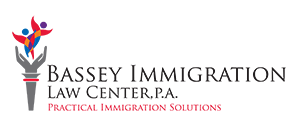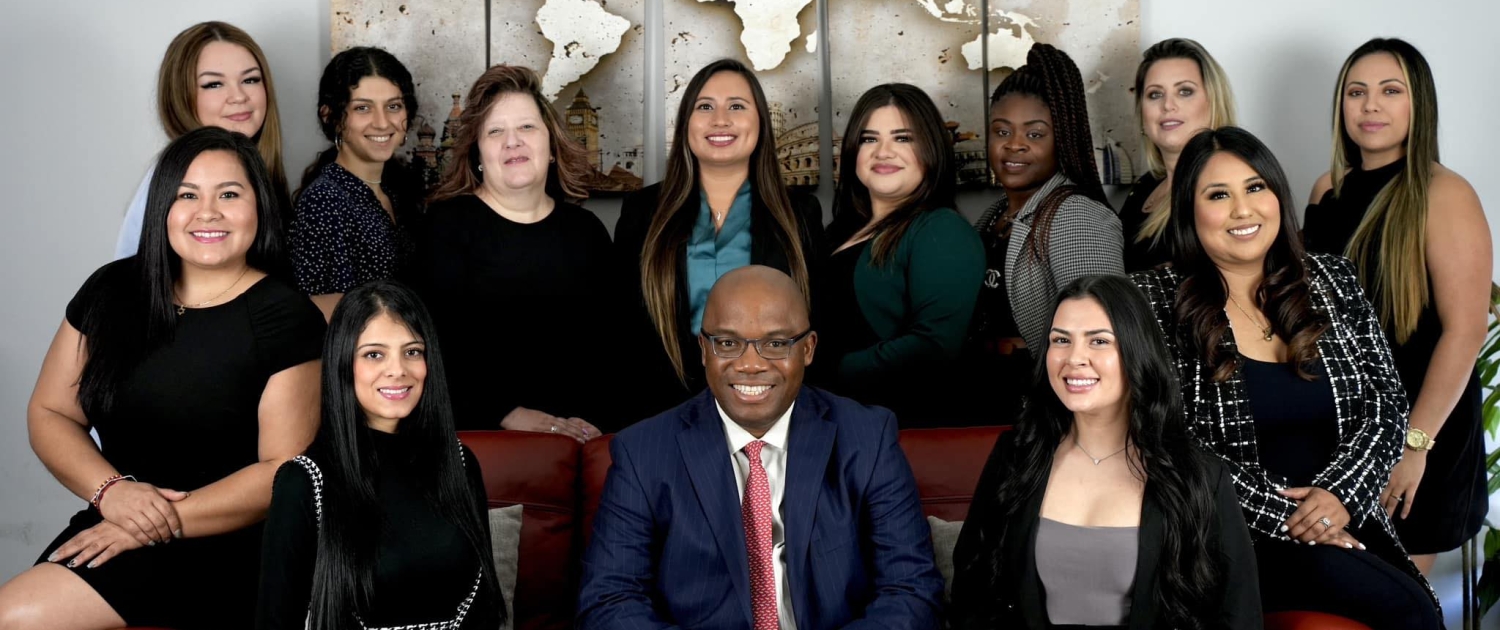The Florida family immigration lawyers at Bassey Immigration Law Center help non-U.S. citizens become United States citizens. Our dedicated team of immigration attorneys can provide straightforward answers to your questions about attaining citizenship status, including a review of all requirements and documentation, application filing, eligibility criteria, upgrading from your green card status, naturalization procedures, and processing time. We are committed to giving you and your loved ones the tools you need to realize your own American Dream.
Every year, tens of thousands of non-U.S. citizens begin the process of applying for U.S. citizenship. Their communal quest is a testament to the rights and benefits of U.S. citizenship that make our country the envy of the world. Those rights and benefits include the freedom of speech, freedom of religion, the right to vote and run for elected office, to own a firearm, to become a federal employee, to seek protection from deportation, to sponsor family members for green cards, and due process of law through a trial by a jury of your peers in our judicial system. U.S. citizenship also imposes certain responsibilities, such as participation in the democratic process, responding to a summons for jury duty, and paying taxes that produce revenue for the country’s federal budget.
Helping You Build Your Life In The U.S.
If your immigration plan is to upgrade from green card status to full citizenship in the U.S., or you want to be a citizen so your voting rights can be established in time for our 2020 general election, we have the experienced lawyers who can make your dream a reality — at the Bassey Immigration Law Center, P.A.
Our skilled, talented staff have built a solid reputation for successful service to hundreds of immigration clients, especially citizenship applicants and steps you need to know. Aniefiok Bassey, managing attorney at the firm, leads an exceptional team headquartered in Tampa and Clearwater to serve you better throughout the citizenship process.
What are the Benefits of Citizenship?
The benefits and rights of citizenship are almost too numerous to mention — rights that are the reasons why our country is the envy of many in the world. With citizenship comes freedom of speech, freedom of religion, the right to vote, to run as a candidate for election, to own a firearm, to become a federal employee, to seek protection from deportation, to sponsor family members for green cards and to undertake a trial by a jury of your peers in our judicial system.
As for the responsibilities of being a U.S. citizen, these include participation in the democratic process, responding to a summons for jury duty, obeying all laws and paying taxes that produce revenue for our annual federal budget. Every year, thousands of aspiring citizens agree to uphold these duties.
As you anticipate taking on these challenges, look to Bassey Immigration Law Center attorneys for honest answers to your questions about citizenship, including requirements, applications, eligibility criteria, green card vs. citizenship counsel, U. S. naturalization procedures, U.S. citizenship processing time, documentation and any other facet of this often complex, confusing, time-consuming process. We are dedicated to your brighter future and that of your loved ones.
Contact Bassey Immigration Law Center, P.A., In Tampa Or Clearwater, Florida. The firm has decades of immigration law experience on our side. To arrange your $150 initial consultation, call either of our law offices at 813-600-3340. All email messages are responded to promptly.
What is a Green Card?
A Permanent Resident Card, or “Green Card,” permits non-U.S. citizens to live and work permanently in the U.S. There are ways to apply to become a United States citizen without first becoming a permanent resident, but the process is more complex, and the application has a higher probability of being denied, particularly if the applicant has ever been an undocumented immigrant. Non-U.S. citizens with a Green Card will have a much smoother path toward citizenship.
Am I Eligible for a Green Card?
Those with questions about their eligibility for a Green Card should contact an immigration lawyer to determine if they fit within any of the categories required by the application. Applicants must demonstrate inclusion in groups such as:
- Immediate family member who is a U.S. citizen.
- Immigrant worker, immigrant investor, or a physician pursuant to the Physician National Interest Waiver.
- “Special Immigrants,” including: religious workers; juveniles who need court protection due to child abuse, neglect, or abandonment; Iraqi and Afghan nationals employed at one time by the U.S. government; international broadcasters; employees and family members of an international organization or NATO.
- Refugee or asylum status
- Victims of human trafficking, crime, and abuse.
Eligibility may also be found within certain more narrowly defined other categories or continuous residency rules as defined by the Registry. Immigrants recently wed to U.S citizens and foreign investors with visa may only be eligible to receive two-year conditional residency. They will have to jump through other legal hoops if they want credit for those years when they pursue permanent status. In sum, applying for a Green Card does get complicated, and delays can be lengthy and discouraging.
Florida residents in pursuit of a Green Card are well-advised to call on experience for help. Bassey Immigration Law Center is the firm who can provide the deep insight, develop the correct strategy, organize your efforts, and help get that application approved.
Naturalization: Becoming a U.S. Citizen
Generally, Green Card holders who are over the age of 18, have been legally in the U.S. for five years, and have no questionable special circumstances (e.g., no felony convictions) are eligible to apply for U.S. citizenship through the naturalization process. Persons who do not satisfy these basic criteria may still have an opportunity to apply for citizenship based on exceptions you should discuss with your immigration and naturalization attorney.
For this leg of the journey to citizenship, candidates will have to prepare and submit Form N-400, the Application for Naturalization. Other obligations include having complete biometrics taken and background checks performed and completing an interview and test with U.S. Citizenship and Immigration Services. If the applicant does qualify for U.S. citizenship, the naturalization process could take as long as a year (sometimes more) from the date of submission of the application until final approval.
Step-by-Step Guide to the Naturalization Process
The naturalization process typically takes between 3 and 12 months, starting from the date Form N-400 (Application for Naturalization) is filed until the applicant takes the Oath of Allegiance and becomes a U.S. citizen. Timeline variations depend on case complexity and local USCIS processing times.
- Biometrics Appointment: After submitting Form N-400, USCIS will send a Form I-797C, Notice of Action, and schedule a biometrics appointment at a nearby Application Support Center (ASC). At this appointment, USCIS will collect fingerprints, a photograph, and a digital signature to conduct background checks.
- Naturalization Interview and Exam: Applicants must attend an in-person interview with a USCIS officer. Bring your Permanent Resident Card (Green Card), government-issued photo ID, appointment notice, and all passports and travel documents reflecting absences from the U.S. since becoming a lawful permanent resident. The officer will review your application, assess your eligibility, and administer the English language and U.S. civics tests.
How to Prepare for the Exam
It is important to prepare thoroughly for both the English language test and the U.S. civics test, which are part of the naturalization interview. If you fail either portion, USCIS will give you a second opportunity to retake the failed portion(s) within 60 to 90 days after the initial interview.
If you fail the same portion a second time, your naturalization application will be denied. USCIS provides free resources to help applicants prepare for both tests, including official study guides, practice questions, and interactive tools. Resources are available in multiple languages and are available at their website. In addition, certain exemptions and accommodations are available under U.S. immigration law.
The Oath of Allegiance Ceremony
At the Oath of Allegiance ceremony, applicants formally become naturalized U.S. citizens by taking a sworn oath that includes a renunciation of prior allegiances to other nations and a promise to support and defend the Constitution and laws of the United States against all enemies, foreign and domestic. The ceremony marks the final step in the naturalization process.
Depending on the location and number of participants, the event typically lasts about one to two hours and includes a presentation on the rights and responsibilities of citizenship, distribution of naturalization certificates, and sometimes special guest remarks.
Common Delays and How to Avoid Them
Some common delays on the path to naturalization are beyond the applicant’s control, such as USCIS backlogs. Avoidable delays include mistakes on Form N-400 or missing documents. The best way to prevent these delays is by having an immigration attorney prepare and review your application to ensure forms are filled out correctly, and all relevant documents are included.
Special Paths to Citizenship
Most people must live in the U.S. for at least five years as a legal permanent resident before filing for naturalization. Certain individuals can receive an expedited path to citizenship. These include:
- U.S. Citizen Spouses: A lawful permanent resident (green card holder) living in the U.S. in a marital union with a U.S. citizen spouse for at least three years may apply for naturalization. They must also meet all other eligibility requirements, including continuous residence, physical presence, and good moral character.
- Military Service Members: Individuals who have served honorably in the U.S. armed forces for at least one year may be eligible for naturalization. They may be exempt from some requirements, such as residency and physical presence, and Form N-400 filing fees are waived.
- Children of U.S. Citizens Born Abroad: Children born abroad to U.S. citizen parents may acquire citizenship at birth, depending on factors such as the child’s date of birth, marital status of the parents, and the U.S. citizen parent’s physical presence in the U.S. prior to the child’s birth. Requirements differ based on whether the child was born before or after June 11, 2017, particularly in cases involving unmarried U.S. citizen fathers.
- Derivative Citizenship: Children under 18 who are lawful permanent residents residing in the U.S. in the legal and physical custody of a naturalized U.S. citizen parent may automatically acquire U.S. citizenship, provided all statutory conditions are met. This is not an application-based process but rather an automatic grant of citizenship by operation of law.
Legal Help for Complex Citizenship Cases
Citizenship cases are frequently complex. At Bassey Immigration Law, we can help those dealing with prior deportation orders, lengthy absences from the U.S., or criminal issues. We can also file waivers or motions to reopen your case if threatened with deportation.
An Immigration Law Firm Serving the Florida Suncoast
Bassey Immigration Law Center is a long-time trusted resource for non-U.S. citizens in Florida as they navigate the complex forms and procedural requirements that come with getting a Green Card and becoming a Naturalized U.S. citizen. Please complete our online form, or call us to schedule a consultation. We have offices conveniently located in downtown Tampa and Clearwater.

